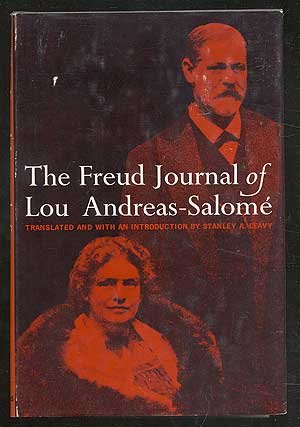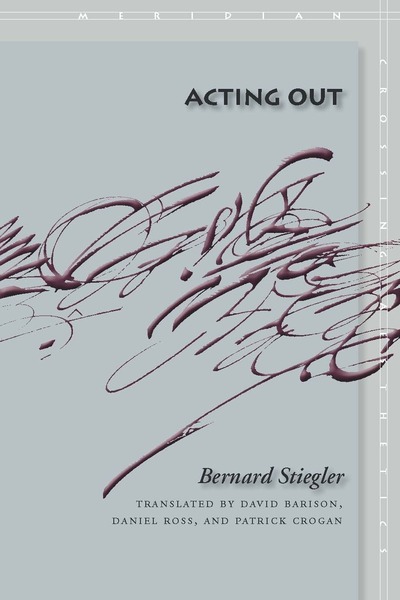Lou Andreas-Salomé: The Freud Journal (1958/1964)
Filed under book, personal journal | Tags: · love, memory, narcissism, psychoanalysis, sexuality

Lou Andreas-Salomé (1861–1937) was a Russian-born psychoanalyst and author of studies on Nietzsche and Rilke.
In 1911, she participated in the International Psychoanalytic Congress in Weimar, and shortly after went to Vienna to undergo a training analysis with Freud. Written during the years 1912-1913, the journal begins with her participation in his Wednesday evening study group and Saturday evening lectures. Following her training, Salomé worked together with her friend the physician and analyst Viktor Tausk at Frankl-Hochwart’s clinic in Vienna and attended both the meetings of the Vienna Psychoanalytic Society and the discussion evenings hosted by Alfred Adler, all reflected in the diary.
Originally published as In der Schule bei Freud, 1958
Translated and With an Introduction by Stanley A. Leavy
Publisher Basic Books, New York, 1964
211 pages
review (Ban Wang, American Imago)
Salomé’s biography at padd.at
Salomé at Wikipedia
PDF (112 MB, no OCR)
See also Victor Tausk’s On the Origin of the “Influencing Machine” in Schizophrenia (1919/1933)
Bernard Stiegler: Acting Out (2003/2009)
Filed under book | Tags: · individuation, narcissism, philosophy, synchronization

“Acting Out is the first appearance in English of two short books published by Bernard Stiegler in 2003. In How I Became a Philosopher, he outlines his transformation during a five-year period of incarceration for armed robbery. Isolated from what had been his world, Stiegler began to conduct a kind of experiment in phenomenological research. Inspired by the Greek stoic Epictetus, Stiegler began to read, write, and discover his vocation, eventually studying philosophy in correspondence with Gérard Granel who was an important influence on a number of French philosophers, including Jacques Derrida, who was later Stiegler’s teacher.
The second book, To Love, To Love Me, To Love Us, is a powerful distillation of Stiegler’s analysis of the contemporary world. He maintains that a growing loss of a sense of individual and collective existence leads to a decreased ability to love oneself, and, by extension, others. This predicament is viewed through a tragic event: in 2002, in Nanterre, France, Richard Durn, a local activist, stormed the city’s town hall, shooting and killing eight people. Durn committed suicide the following day. The later publication of Durn’s his journal revealed a man struggling with the feeling that he did not exist, for which he tried to compensate by committing an atrocity. For Stiegler, this exemplifies how love of self becomes pathological: a “me” assassinates an “us” with which it cannot identify.”
How I Became a Philosopher was originally published in French in 2003 under the title Passer al’acte.
To love, to love me, to love us was originally published in French in 2003 under the title Aimer, s’aimer, nous aimer.
Translated by David Barison, Daniel Ross, and Patrick Crogan
Publisher Stanford University Press, Stanford, California, 2009
Meridian: Crossing Aesthetics series
ISBN 0804758697, 9780804758697
93 pages
PDF (updated on 2020-8-7)
Comment (0)Palo Fabuš: Laschova teorie narcistní kultury jako inspirace pro mediální studia (2009) [Czech]
Filed under thesis | Tags: · audience, communication, media, media studies, narcissism, postmodernity, psychoanalysis, self, survivalism, theory
Práce se pokouší představit teorii narcistní kultury amerického historika Christophera Lasche jakožto inspiraci pro mediální studia. Činí tak analýzou vybraných mediálních teorií autorů Jeana Baudrillarda, Joshuy Meyrowitze, Neila Postmana a dvojice Brian Longhurst a Nicholas Abercrombie. Malá pozornost, kterou tyto teorie venují roli mediálního publika je zde interpretována jako bílé místo, které by Laschova teorie mohla zaplnit modelem narcistní osobnostní struktury.
Lasch ve své historické studii kulturních proměn ve 20. století vychází z rozpadu rodiny způsobeného psychologizací společnosti, vlivem reklamy a nástupem byrokratického paternalismu, který nahradil původně rodičovské funkce. Rodí se tak narcistní osobnost vyznačující se vnitřním psychologickým motorem sebe-nenávist a nutkavou potrebou obklopovat se iluzemi všemohoucnosti, která se projevuje vyhledáváním spektáklu a stažením se do sebe. Inspirativnost této teorie pro mediální studia je tak představena v podobe užitečného modelu pro analýzu médií v paradigmatu aktivních publik.
Klíčová slova: narcismus, Lasch, postmodernita, média, komunikace, Já, survivalismus, psychoanalýza.
Diplomová práce
Masarykova Univerzita, Fakulta sociálních studií
Vedoucí práce: prof. PhDr. Jiří Pavelka, CSc.
Brno: FSS MU, 2009
Lasch’s narcissism culture theory as an inspiration for media studies
The thesis aims to introduce the narcissism culture theory of american historian Christopher Lasch as an inspiration for media studies. It does so by analysing selected media theories of Jean Baudrillard, Joshua Meyrowitz, Neil Postman and Brian Longhurst with Nicholas Abercrombie. Little attention these theories draw to the role of media audience is interpreted here as a gap, which could be potentially filled by Lasch’s theory with its model of narcissistic character.
In his historical study of culture changes in 20th century Lasch starts from the dissolution of family inflicted by psychologization of society, influence of advertising and emergence of bureaucratic paternalism substituting rearing function of parents. Through these processes comes birth of narcissistic personality, which can be distinguished by inner psychological drive of self-hate and compulsive need to surround him- or herself with illusion of omnipotence manifested through seeking out of spectacle and drawing within. The inspirative potential of the theory is thus introduced in a form of a useful model for a media analysis within the active audience paradigm.

